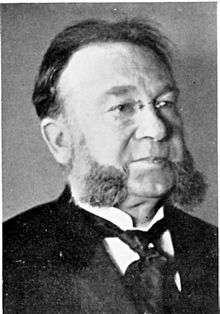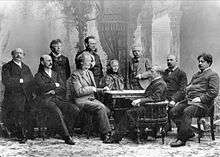Iver Holter
Iver Paul Fredrik Holter (13 December 1850 – 27 January 1941) was a Norwegian composer. He was conductor and music director of the Oslo Philharmonic for a quarter century.
Iver Holter | |
|---|---|
 | |
| Born | Iver Paul Fredrik Holter 13 December 1850 |
| Died | 27 January 1941 (aged 90) |
| Era | Romantic |
Biography
Iver Paul Fredrik Holter was born in Gausdal, Oppland, Norway. His parents were Caspar Georg Holter (1812–1880), a minister, and Caroline Theodora Børresen (1818–1857). He spent his adolescence at Gjerpen in Skien, where he received violin lessons from the German-born organist Friederich Wilhelm Rojahn (1820-1886). Holter had originally studied medicine but by 1876, he changed career paths to become a musician. He first studied music with Johan Svendsen and afterward in Leipzig (1876–79). He continued his music studies in Berlin (1879–1881).[1]
In the autumn of 1882, he followed Edvard Grieg as conductor for the Bergen Philharmonic Orchestra. In autumn 1886, he became music director and conductor of the Oslo Philharmonic, a position he held for 25 years. Holter suggested the founding of a city orchestra which could play at municipal festivities, concerts and in the theatre, and as a result of this, the orchestra gained municipal support from 1889.

Holter became a central figure in the city's musical life. In 1890 he founded the Oslo Bys Orchestra, and he was conductor for the Music Association (Musikkforeningen) in Oslo for a quarter century. During the period 1900 to 1906 he edited the music magazine, Nordisk Musik-Revue. In 1912, he was one of the founders Norwegian Musical Artists' Society (Norsk Tonekunstnersamfund).[3]
Holter composed piano music, songs and choral music, including a series of cantatas for various major and minor events. As a composer, he followed the classic-romantic ideals. His numerous compositions include a symphony, string quartets, a violin concerto, cantatas, songs and choral pieces. Most notably, he wrote music for Goethe's Götz von Berlichingen and the orchestral work St. Hans Kveld.[4]
Selected works
- Bagatellen für das Pianoforte. 1879
- 2 String Quartets. 1880, ?
- Vier Gesänge für eine mittlere Stimme mit Begleitung des Pianoforte. 1881
- Til Fædrelandet (cantata, text by T. Caspari). 1895
- Kantate ved den 7de store Sangerfest (text by M. Rolfsen). 1896
- Nürnberg (cantata, text by T. Caspari). 1898
- Kantate ved indvielsen af Kristiania handelsstands forenings nye hus (text by C. Dysthe). 1912
- Kristiania-Kantate (text by T. Caspari). 1924
- Olavskantate (text by T. Caspari). 1930
- Violin Concerto in A minor
- Symphony in F major